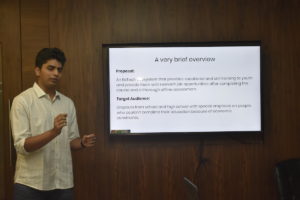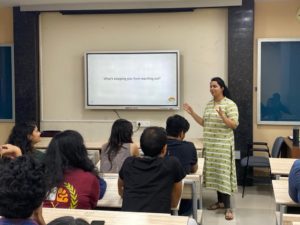Please introduce yourself
Sagar: Hi! My name is Sagar Menon. I’m 22 years old and I recently graduated as an Information Technology engineer from Narsee Monjee Institute of Management Studies in Mumbai. I’ve been lucky to be born and brought up in this wonderful city!
Neelika: Hi, I’m Neelika Chakrabarti and I’m 21 years old. I have been pursuing Computer Science Engineering and soon I will graduate from NMIMS University in Mumbai, India. I have a wide set of interests that span beyond my academic field of specialization and I’m passionate about my vision to create a more empowered and empathetic community.

What three adjectives would people use to describe you?
Sagar: Enterprising, proactive, and thoughtful. (I promise I crowdsourced all these adjectives!).
Neelika: Ambitious, hardworking, and resourceful.
What is your favorite book and why?
Sagar: My favorite book has to be the Blue Ocean Strategy by W. Chan Kim and Renée Mauborgne. This book captured my imagination and inspired me to look for blue oceans wherever I go and in whatever I do.
Neelika: My favorite book is Dale Carnegie’s How to Win Friends & Influence People. The best part about this book is that it adroitly captures various concepts that we often overlook or miss through real-life examples and one can use it to become more successful, understanding, and sociable. I’ve personally gained perspective and have learned a lot from this book.
What is the challenge your venture seeks to address?
Neelika: Mental health is often stigmatized and is a taboo in our society. Millions of students succumb to pressure at school and lose their lives as a result of this. Our venture, Citta, is an attempt to combat student suicide and to bridge the gap between mental health support and students.
Have you been personally affected by this issue? If so, how?
Sagar: I was a bright kid in school and everyone set high expectations from me thereafter. There were certain junctures in my life where I couldn’t sustain the pressure and faltered. I felt alone in my struggles and I never even considered the option of asking for help, given the stigma and the financial barriers I had to face as a student.
Neelika: As an engineering student who has been a part of the draconian education system for several years now, I’ve personally struggled with keeping my mental health in check and have witnessed my peers face similar issues. It took me years to acknowledge my feelings and to go to therapy because the concept of mental health was always trivialized and I did not know where to begin or how to ask for help.

How is your venture addressing these challenges?
Sagar: Our venture wants to normalize asking for help. To tell the student community that it’s okay to not be okay and that you don’t have to be alone in your struggles.
Neelika: We use the “Crawl, Walk, and Run” strategy. We start out with awareness workshops conducted by mental health professionals at educational institutions and we also create social media campaigns. We then build a carefully curated network of mental health professionals who can provide subsidized/pro-bono services for students. Using these networks we hope to eradicate the stigma around mental health and create a safe space for everyone.
What does your venture hope to achieve?
Neelika: Through Citta, we want to make therapy more affordable and accessible to Indian students. We also want to create a more understanding community by educating people about mental health. The message behind our tagline “You’ve got this!” is to reinforce that it is okay to ask for help and to create a safe space for students so that they know that they are not alone. Our end goal is to equip students to deal with stress and to prevent students from taking any unnecessarily drastic steps.
What inspired you to start your venture?
Neelika: India ranks very highly in student suicide rates. According to several reports, one student commits suicide every hour in India. Millions of students lose their lives due to the lack of support, affordability, and access to mental health resources. This issue has always been close to my heart because of my personal journey and I wanted to make it better for others by ensuring that they did not have to go through the same. I realized that creating an organization by the students, for the students, could be the first step towards combating this issue. This is what inspired me to take charge and to start Citta with Sagar.
What excites you about the Resolution Fellowship?
Sagar: My favorite thing about the Fellowship has to be the wonderful people I’ve had the privilege of interacting with. To see The Resolution Project team work endlessly to provide us with better opportunities is truly a humbling experience.
Neelika: The opportunity to be a part of such a diverse and talented network feels unreal. The best part about this is that it’s a lifelong fellowship and the mentorship that we receive is not limited to just our social ventures but is also extended to our personal and professional endeavors.
How will the Fellowship help you achieve your goals?
Sagar: The Fellowship acts as a catalyst by providing access to a vast professional network, resources, and an opportunity to interact with changemakers from across the world.
Neelika: Apart from the seed funding, which helps us financially, we have access to a lot of resources and also to a wide network of professionals with varied backgrounds. In addition, receiving constant mentorship and support from our Resolution Guides, Natasha, Hersh, and Matthew, is what drives us closer to our goals.

What advice would you give other college students who are looking to start their first social venture?
Sagar: I vividly remember the closing ceremony of the 2019 Harvard WorldMUN in Madrid where Resolution’s CEO, George Tsiatis, asked: “Should Young People Wait To Lead?”
The whole auditorium in unison shouted: “NO.”
That’s the only message I want to amplify: If there’s something you honestly and deeply care about, you are never too young to make an impact.
Neelika: I’m going to share a quote by Alan Turing that has really inspired me: “Sometimes it is the people no one can imagine anything of who do the things no one can imagine.”
My only piece of advice would be to take that first step and not overthink it. You don’t need to have a complicated or fancy idea to make a difference. It’s the small steps that matter and you can always build upon it and grow from there.
What do you love most about your home community?
Neelika: My homeland, India, is rich in culture, heritage, and—most importantly—in its spirit of inclusiveness. I consider myself lucky to be a part of the largest democracy in the world. We believe in Vasudhaiva Kutumbakam which is a Sanskrit phrase that translates to “the world is one family.” I love how, despite our differences, we live in harmony, and that is what makes India the land of unity in diversity.
Sagar: Indian food and Bollywood! We like our food with a lot of spice and our movies with a lot of music and dancing. Email me for recipes and movie recommendations!
What role do young leaders play in the world today?
Sagar: Young leaders provide a “sneak peek” into how our future can be a more empathetic and equitable place to live, while also making a real impact today.
Neelika: Young leaders are constantly catalyzing change and providing fresh perspectives. This is especially important in today’s dynamic world where agility and passion are a must to keep up with the evolving trends. Young leaders play a very crucial role in determining what our future world is going to look like and are huge assets to society.

Why is it important for young people to focus on social impact?
Neelika: Young people have the power to lead and to inspire revolutions. One does not have to wait to be an adult to be an active member of the community. We are living in challenging times where various environmental and socio-economic issues are on the rise. There is a need now more than ever for the youth to take charge and to assume responsibility to create a better future.
Sagar: If you are privileged and are lucky enough to lead a comfortable life so far, it’s imperative that you give back to society in whatever way you deem fit. Sometimes, that can take the form of a social venture, but that’s not the only way you can make an impact. It could be as simple as teaching English or Math to your friend’s children.
Observe things and people around you. I assure you there are problems that need your attention. Every act of kindness counts.
Tell us more about your work in response to COVID-19
Neelika: As a result of the pandemic and a nationwide lockdown, suddenly everything seemed to have come to a halt. A lot of students have been struggling to keep their mental wellbeing in check due to the uncertainty that this has brought upon them. As we are no longer able to conduct on-ground workshops, we decided to increase our social media presence and online services. We have been collaborating with organizations and mental health professionals. Some of our activities during this Covid-19 lockdown include hosting Instagram Live sessions with experts, creating crowd-sourced music albums on Spotify, curating posts on topics like positivity, relationships, and engaging users with our #SelfExpressionInIsolation campaign which includes art therapy and other activities.
Sagar: The pandemic really has taken a toll on the mental health of students given the uncertainty that looms over, which is why we compiled a list of counselors and professionals offering their services free of cost during this pandemic.
Through our online activities and workshops, we have directly impacted over 200 people during this pandemic!